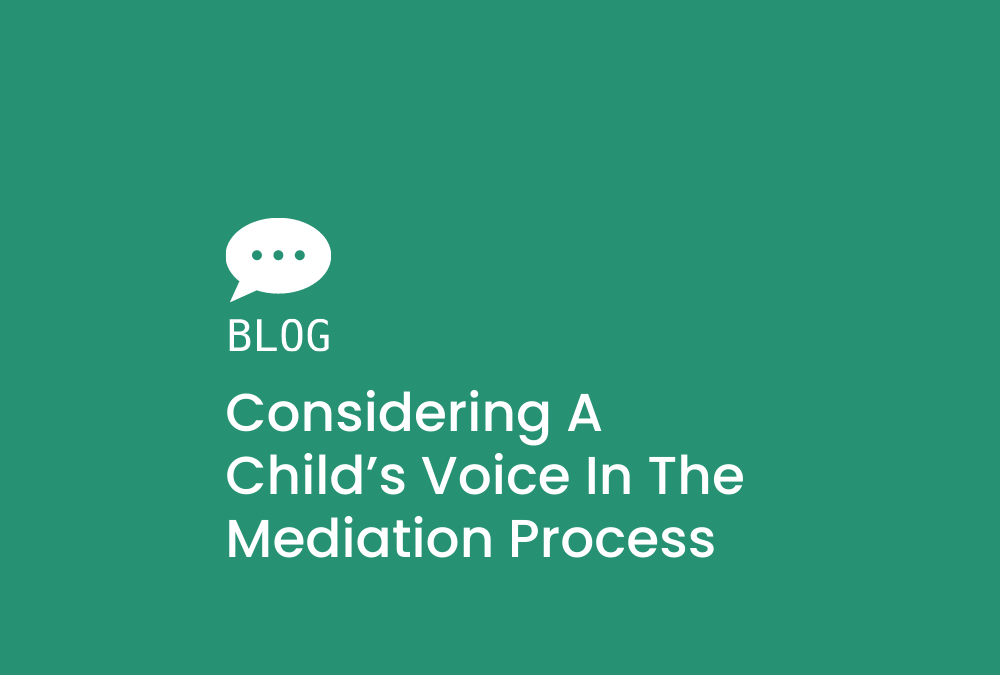Considering a Child’s Voice in the Mediation Process.
Today is Day 4 of Family Mediation Week, and the focus today is on considering a child’s voice, rights and interests in the process. From my experience as a mediator, child-inclusive mediation is an excellent process to ensure that children have a voice in the mediation process and are heard. The pitfalls of child-inclusive mediation seem to be when the parents are unwilling to listen to what the child or children are saying and this can have a negative effect as the child is left thinking that no one is taking notice of them.
I was shortlisted as family mediator of the year at the National Mediation Awards in 2020 and I was sent a number of books. One of which was ‘The Rock Pool SOS’ by Polly Walker. This book is a short, colourful story about sea creatures in a rock pool who have a dispute. They resolve their dispute by going to see the ‘wise old whelk’ who provides some calming words and helps them resolve their dispute. I contacted the author Polly Walker and she was able to prepare the you tube video reading her story. It would be great if everyone could share the you tube video and share the benefits of promoting mediation to young people.
My first thought after reading this book was that it is great but how can I use this book in my current practice as a family mediator? I didn’t feel it would be helpful to provide to parents going through mediation to pass to their children at this stage as it doesn’t discuss the child inclusive mediation process.
I then read this book to my 5 year old daughter and half way through the book I asked her before they went to see the wise old whelk, what would she do if at school she had a dispute with one of her friends? She thought about it for a moment and then said “do you mean if we both wanted the same toy?”, I said yes how would you resolve it? She said “Mummy I would ask everyone to vote on it after hearing from us both why we felt that we should have it.” I was shocked at her response and thought if a 5 year old can understand how important it is to listen and how to deal with disputes, why couldn’t my legal clients or clients in mediation consider that there are 2 sides to every story and to look at ways forward to resolve the dispute.
It hit home to me how mediation should be a key part in children’s education and that they should learn from a young age how to resolve disputes by putting their position across in a calm voice, listen to what the other party is saying and then use their ‘brains together – to solve problems creatively’. The book also mentions there is no harm in asking for assistance if you need a helpful guide.
It was Anti bullying week on the 16th February and I sent my daughter in with this book and also another book called ‘Worm, Slug, Maggot and Leech and their Troublesome Transformations!’ This book again is short, colourful and informative to children who may not be happy in their skin. This book again is great for schools and to make children think about how other people may be feeling and about how they feel themselves about any issues they may have. The feedback from the teacher was very positive and said it was great to read the books to the children and then have an open discussion about the topic. The Rock Pool SOS also has ideas and activities for teachers and parents in the back of the book which is great. I think this book should be used as part of the curriculum in all primary schools. I know some schools have ‘peer mediation’ which aims to teach children and young people how to deal with conflict compassionately and peacefully. This improves pupils listening skills, respecting other people’s views point and demonstrating empathy. This type of mediation aims to enhance children’s learning and prepares them for coping with conflict in later life with life skills to deal with disputes. This can be in high school, with colleagues in adult life or when facing separation with a partner.
I spoke to my daughter’s school and they do not have ‘peer mediation’ in place and I think that as a mediator and trying to promote family mediation, we should also start with young people so that they learn that there is a better way to resolve disputes and not continue in the footsteps of their parents if they are embroiled in a difficult separation. It is becoming more the norm now that children are from separated families and I see first-hand the damage that conflicting parents have on their children’s health and wellbeing and I think as well as trying to promote mediation and educating parents through Separated Parenting Information programmes etc that more focus should be on young people to teach them a better way to deal with disputes as they face adult life.

